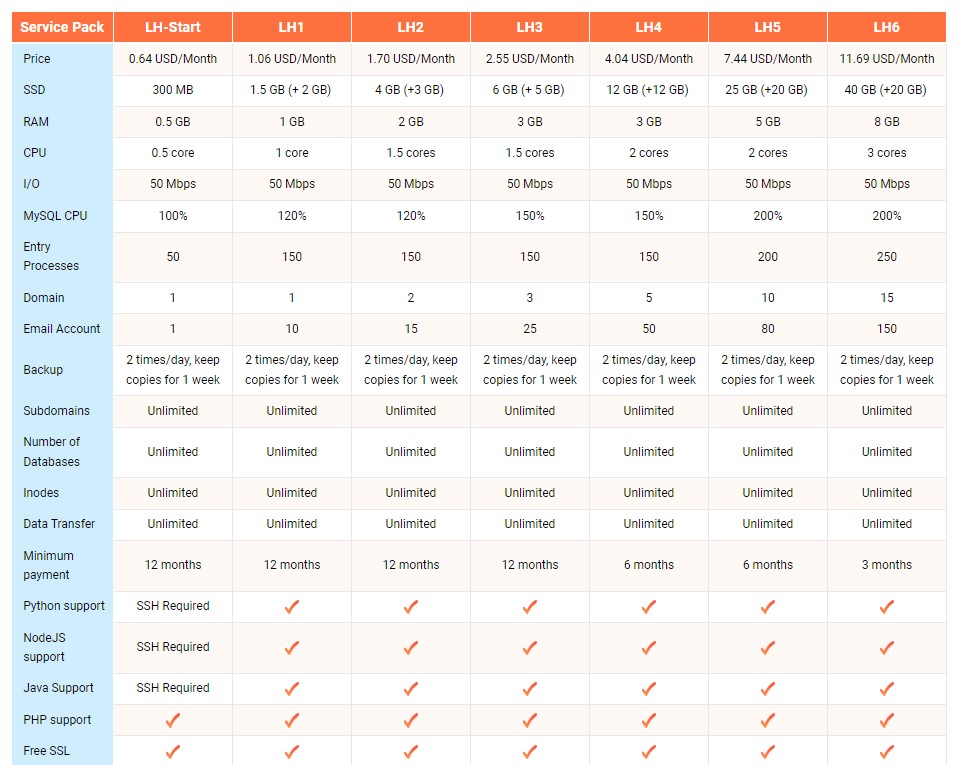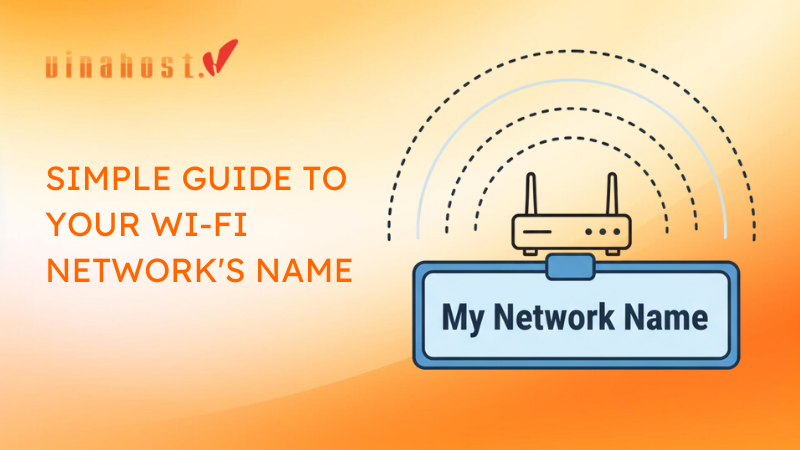What is Shared Hosting? Shared Hosting is a service in the field of web hosting, where many websites are located on the same web server connected to the internet. This is a popular storage option on the market. Shared Hosting is a familiar term to people who learn about websites. Let’s join VinaHost to learn information about shared hosting through the following article.
1. What is Shared Hosting?
If you are one of those who regularly learn about websites, perhaps Shared hosting is a term that is no longer unfamiliar to you. However, do you really understand what Shared hosting is?
Shared Hosting is a service in the hosting field, where many websites share a web server connected to the internet. To make it easier to imagine, the hosting provider will place a server in the data center and divide the resources therein to serve users.
If you have a website that is not too heavy on resources, Shared Hosting is a good choice with an affordable price compared to other services. Considered easy to use and does not require deep knowledge of the website, this service attracts many users. This is a popular storage option on the market.

Also Read: Unveiling the Web’s Hidden Foundation: What is Web Hosting?
2. How Does Shared Hosting Work?
Shared Hosting is a popular website hosting method in which multiple websites share the resources of the same server. When users visit a website, data is sent from the server to them over the Internet. The server is optimized for multiple websites, but varying traffic may affect performance. Each site’s data is kept private and secure in this shared environment. Shared Hosting provides server management and support services, helping users manage websites without the need for deep technical knowledge.
3. Types of Shared Hosting Plans
3.1. Linux-Based Hosting
- Operating system: Using the Linux operating system, famous for its stability and high security.
- Server management: Often use control panels like cPanel or Plesk to help users easily manage their website and server settings.
- Programming and databases: Supports popular programming languages and databases such as PHP, Perl, Python and MySQL.
- Cost: Usually cheaper because Linux is open source, without high licensing fees.
- Application: Suitable for websites using open source platforms such as WordPress, Joomla or Drupal.
3.2. Windows-Based Hosting
- Operating system: Runs on Windows operating system, well compatible with Microsoft technologies.
- Server management: Usually uses the Plesk control panel, helping users manage the website easily.
- Programming and database: Supports technologies such as ASP.NET, MSSQL and Access databases, suitable for applications developed in the Microsoft environment.
- Cost: Usually more expensive due to licensing fees for the Windows operating system and Microsoft applications.
- Applications: Good for websites and applications that need to integrate with Microsoft software and technology.
These two types of shared hosting plans cater to different needs and technology preferences, helping users choose based on their specific requirements and skills.
4. Advantages of shared hosting
- Low cost: Shared Hosting is an economical option with lower prices than other hosting services.
- Easy to use: Suitable for beginners with website management, with a friendly and easy-to-understand interface.
- Manage multiple websites: Allows managing multiple websites under the same hosting account.
- Support services: Provides statistical services, email, automatic installation and copyright updates.
5. Disadvantages of shared hosting
- Resource limitation: Due to sharing resources with many other websites on the same server, it can cause resource and performance limitations.
- Low performance: Because of resource sharing, website performance can suffer when there is a lot of traffic.
- Limited security: Due to using the same environment, security may be affected by other websites.
- Limited customization: High customization of server configuration is not allowed due to shared service limitations.
Shared Hosting is suitable for beginners or small, personal websites. However, you need to consider the low price and limitations in resources and performance before choosing.

Also Read: What is VPS? | Unveiling the Power Behind Virtual Private Servers
6. Who Should Use Shared Hosting?
Shared Hosting is suitable for small projects, individuals, businesses that are just starting out or have a small amount of website traffic. Users do not need in-depth knowledge of server management, and want to save costs.
6.1. Personal Websites, Blogs, and Portfolios
These sites typically have low to moderate traffic and do not require a lot of server resources. Shared hosting offers an affordable solution for maintaining an online presence.
6.2. Small Businesses with Low Traffic Volumes
Small businesses that do not expect high traffic can save costs with shared hosting. It’s enough for basic business websites like contact information, service descriptions, and a few static pages.
6.3. Individuals Starting with Their First Website
Shared hosting is easy and low risk for new web developers. Usually comes with a user-friendly dashboard and one-click installation for popular CMS platforms like WordPress.
6.4. Budget-conscious individuals
Shared hosting is the most affordable type of web hosting. It allows online presence without investing a lot of money.
6.5. Non-technical users
Shared hosting providers typically offer managed services, handling maintenance, updates, and server security. This is ideal for those who lack technical expertise or don’t want to manage servers.

Also Read: What is a Server? Understanding the Backbone of Modern Technology
7. Is Shared Hosting Right for You?
Shared hosting is ideal for those starting out with web hosting. It’s budget-friendly, user-friendly, and requires minimal technical knowledge. This makes it perfect for simple websites like personal blogs or small business ventures.
Shared hosting is also a springboard for those who want to learn web design, coding, or WordPress management. It offers a solid foundation to build your website’s skills and presence without a significant initial investment.
Think of shared hosting as a stepping stone. It’s easy to manage and scales seamlessly as your website grows. This lets you focus on creating compelling content and building your online audience, without worrying about complex server maintenance. Once your traffic increases, you can easily upgrade to a more robust hosting plan to accommodate your website’s future needs.
8. Shared Hosting vs Other Hosting Options
| Shared Hosting | VPS | Dedicated Server | Cloud Server | |
| Definition | A web hosting service where multiple websites are hosted simultaneously on a single web server connected to the Internet | Created by using virtualization technology to divide a physical private server into multiple virtual servers | A physical server running on dedicated hardware and support devices like HDD, CPU, RAM, network cards, etc | Cloud Server virtualized computing resources and applications, offering unlimited capacity to handle large traffic volumes |
| Resources | Shared hosting shares resources on a single physical server among multiple shared hosting accounts. It often faces resource limitations and has lower security | The features of a VPS are similar to a dedicated server, but it still shares resources from the original physical server | The resources of a dedicated server are separate, independent, and not shared with anyone | Resources are virtualized over the Internet. High availability and dynamic computing resource usage. |
| Performance | Sufficient for individuals and small businesses. Users do not have deep system access and face limitations with high traffic, potentially affecting website performance due to other sites on the same server | VPS is created and runs on a physical server. At peak times, the physical server may hang, causing the VPS to temporarily shut down | High performance, secure, stable email, full administrative control. Backup deployment is costly | Data is centrally stored on Cloud Storage, with I/O evenly distributed across servers. Data is backed up and ready for recovery. If a physical server fails, the Cloud Server can still operate normally due to data synchronization mechanisms |
| Scalability | Limited scalability due to shared server resources with many other shared hosting accounts. Large websites that exceed resource limits may have their accounts locked if the server is overloaded | Can upgrade resources depending on the remaining capacity of the physical server. Excessive upgrades may exceed the physical server’s capacity | Complex upgrades as they require purchasing specialized hardware. The server may experience downtime during upgrades | Flexible scaling up and down based on changing usage needs |
| Management | Not too difficult to manage, does not require extensive related knowledge | Users have full administrative control of the virtual server similar to a physical server. This requires administrative skills | Users have full control over the server, with the ability to install and configure as desired | Requires users to have knowledge and skills in virtual server management |
| Cost | This is usually the most economical choice for hosting, as the total server maintenance cost is distributed among many customers | VPS has moderate costs, suitable for small and medium-sized businesses requiring high security and independent use | Higher cost than Shared Hosting and VPS. Management costs can be as high as half the rental price to manage the server | Reduced storage costs due to pay-as-you-go usage. However, overall prices are still high for businesses |
This table summarizes the key differences between shared hosting, VPS, dedicated servers, and cloud servers, providing an overview of each option’s definition, resources, performance, scalability, management, and cost.
9. Choosing a Shared Hosting Provider
9.1. Reputation and Customer Reviews
Reputation and customer reviews indicate reliability, performance, and overall satisfaction with the supplier. You can:
- Search for reviews on independent websites, forums and social networks.
- Check if reviews repeat issues like downtime, slow speeds, or good customer service.
- Be wary of testimonials on supplier websites as they can be selective.
9.2. Features Included in the Plan
Different hosting plans offer different features, affecting website functionality and performance. Features to look for:
- Make sure the package provides enough for your needs.
- Check if the plan includes a free domain and email account.
- Find an easy-to-use control panel like cPanel or Plesk.
- Free SSL is important for security.
- Makes it easier to install CMS platforms like WordPress.
9.3. Scalability Options
As your site grows, you may need more resources. You need to:
- Check if there are easy upgrade options to a higher service.
- Look for the ability to adjust resources like CPU, RAM, and storage without disruption.
- Consider add-ons like CDN integration or advanced caching.
9.4. Customer Support Quality
Reliable customer support helps resolve issues quickly and maintain site uptime. How to evaluate:
- Make sure there are multiple support channels such as live chat, phone, and email.
- Check if 24/7 support is available.
- Search for information about response time.
- Comprehensive knowledge base helps you solve common problems.
- Support teams need technical knowledge to handle issues effectively.

Additionally, we also provide:
- VN Domain Registration
- VPS Vietnam
- Dedicated Server Vietnam
- Colocation Vietnam
- Server Cambodia
- VPS Cambodia
10. The Future of Shared Hosting
The future of shared hosting promises to be strong thanks to technological advances, changes in user expectations, and the increased complexity of web applications. Here are the key trends that will shape the future of this service:
Performance and Speed
- Integrated CDN: Content delivery networks (CDNs) will be more integrated to improve page load times and reliability.
- Advanced caching: Advanced caching technologies, such as server-level caching and HTTP/3, will become the standard to increase website speed.
- Fair resource allocation: Better resource allocation techniques will ensure CPU, RAM and bandwidth are shared fairly, reducing performance bottlenecks.
Advanced Security
- Built-in security: Powerful security features such as Web Application Firewall (WAF), DDoS protection, and automatic malware scanning are built-in.
- Zero-trust security model: Apply this security model to ensure all access requests are authenticated and authorized.
- Automatic updates: Automatically updates server and website software to prevent security vulnerabilities.
Improve User Experience
- AI and Automation: AI and automation will make server management, backups, and problem resolution easier.
- Friendly user interface: Easy-to-use dashboard with intuitive interface will help users manage the website more effectively.
- Self-help resources: Rich knowledge base, video tutorials, and AI-powered chatbots provide immediate support.
Scalability and Flexibility
- Flexible Storage: Flexible storage solutions allow users to adjust resources to their needs without disruption.
- Hybrid Solution: Combine shared hosting with elements of VPS or cloud hosting to deliver better performance as your site grows.
- Easy Upgrade: Provides an easy migration path from shared hosting to more advanced solutions such as VPS, dedicated hosting, or cloud.
Sustainability and Green Storage
- Energy-efficient servers: Use energy-efficient servers and data centers from renewable sources.
- Carbon Offsetting: Initiatives to offset carbon emissions through environmental projects.
- Eco-friendly practices: Emphasize sustainable certifications to attract environmentally conscious consumers.
Customization and Personalization
- Matched Hosting Plans: Create custom hosting plans, allowing users to choose the features and resources that suit their needs.
- Personalized Support: Provide customer support with personalized recommendations and problem resolution based on user behavior and needs.
- Modern development tool integration: Better support for development frameworks, CI/CD pipelines, and containers like Docker.
Integrate Emerging Technologies
- Edge computing: Integrate edge computing to process data closer to users, reduce latency, and improve performance for users globally.
- IoT Compatibility: Adapted to support storage and management of Internet of Things (IoT) applications and data.
- AI and Machine Learning: Use AI and machine learning for predictive analytics, providing personalized user experiences and smarter resource management.
Also Read: What is HTTPS? The Secure Gateway to a Safer Internet
11. FAQs
11.1. What happens if my website gets too big for shared hosting?
As your website grows, shared hosting may encounter the following issues:
- Performance bottleneck: When traffic and resource requests increase, page load times can slow and site performance suffers.
- Resource Limits: Shared hosting plans have CPU, RAM, and bandwidth limits. Exceeding this limit may result in a temporary shutdown.
- Scalability Issue: Shared hosting does not have the flexibility to scale resources as needed.
You should upgrade to more powerful hosting solutions like VPS, cloud hosting, or dedicated hosting for more resources, better performance, and greater control.
11.2. Is shared hosting secure?
Shared hosting may be safe but comes with certain risks:
- Shared environment: Many shared websites use the same server, so a security issue on one website can affect other websites.
- Basic security measures: Vendors often implement security measures such as firewalls, DDoS protection, and malware scanning.
- Personal Responsibility: Users are responsible for protecting their website, including using strong passwords, updating regularly, and using security plugins.
You can choose a reputable hosting provider that has strong security measures and adheres to best-in-class standards to protect your website.
11.3. Will shared hosting slow down my website?
Shared hosting can slow down your site because:
- Shared Resources: Limited resources are shared between multiple users, which can cause performance issues if other sites on the same server experience high traffic or use a lot of resources.
- Server overload: Providers can overload their servers by putting too many websites on the same server, leading to reduced performance.
You should choose a provider with high performance reliability and consider plans with better resource management options.
11.4. Can I Upgrade from Shared Hosting in the Future?
Yes, you can absolutely upgrade from shared hosting to more powerful solutions like the following:
- VPS Hosting: Provides dedicated resources and better control, suitable for growing websites.
- Cloud Hosting: Provides scalability and flexibility, allowing you to easily adjust resources according to your needs.
- Dedicated Hosting: Gives you an entire server, ideal for high-traffic or resource-intensive websites.
Most hosting providers offer easy upgrade options and support for switching from shared hosting.
11.5. Is Shared Hosting Right for E-commerce Websites?
Shared hosting can be used for e-commerce websites, but careful consideration should be given:
- Performance: E-commerce sites often require fast load times and high availability, which can be challenging with shared hosting.
- Security: Protecting safe transactions and customer information is extremely important. Shared hosting services may not provide the level of security necessary to handle sensitive information.
- Resources: E-commerce platforms like WooCommerce, Magento or Shopify require more resources than a basic website, which can be beyond the capabilities of shared hosting .
Small e-commerce sites can start with shared hosting, but as the business grows, consider using VPS or cloud hosting for better performance, security, and scalability. Choose shared hosting plans optimized for e-commerce websites to ensure smooth and secure operations.
12. Conclusion
Above is all the information related to the question What is Shared Hosting? Shared Hosting is a good solution for users with small projects that need to save costs and do not require many resources. However, choosing a hosting service should be based on your specific goals and needs, to ensure the website operates stably and effectively. Find out more articles at our Blog and don’t hesitate to contact us for support:
- Email: support@vinahost.vn
- Hotline: 1900 6046
- Livechat: https://livechat.vinahost.vn/chat.php
What is Domain & How It Impacts Your Online Presence
What is DNS Record: The Key to Unlocking the Internet


 Tiếng Việt
Tiếng Việt English
English 简体中文
简体中文






























































































